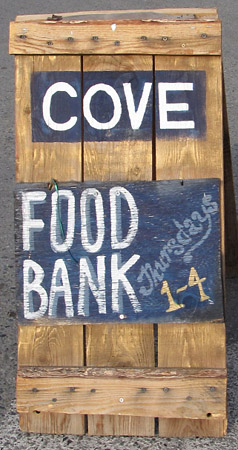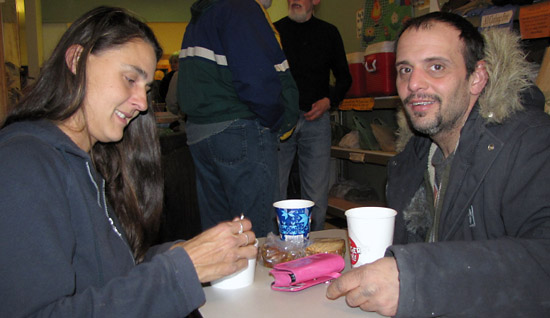| |
 Some of the volunteers for The Cove. L to R: Glenn Schmekel, Director. Tim Lewis, a volunteer since he was 4 or 5. Lois Chavey, who says working there is "the best day of my week". Lynette Hope and Bob Hoffman. Maryann Kirkland. Sue Baldwin, food manager. Some of the volunteers for The Cove. L to R: Glenn Schmekel, Director. Tim Lewis, a volunteer since he was 4 or 5. Lois Chavey, who says working there is "the best day of my week". Lynette Hope and Bob Hoffman. Maryann Kirkland. Sue Baldwin, food manager.
Serving Up Care
The Cove
story and photos by Karen West
Comment on this story >>
 The Cove food bank is in Twisp, next to Glover Street Market. Lynette Hope says it best: “You never know when your life is going to change. It can happen overnight.” She should know. She woke up one day several years ago to find herself going blind from a rare eye disorder.
In six weeks her vision went from 20/20 to 200/400, and it’s still deteriorating. Soon she could no longer work. She had to give up driving. By mid-December of this year, she’d had 27 eye surgeries. She calls herself “a guinea pig for the University of Washington,” willing to try anything that might help save someone else’s vision. What you won’t hear from her is a single sentence that sounds like self-pity. You have a choice, she says, to wallow and feel sorry for yourself. Or you can choose the path she took: “You just go on and be the best you can.”
Hope relies on The Cove, the tiny but bursting-with-life food bank nestled between the Antlers Saloon and the Glover Street Market in Twisp. “I couldn’t feed everybody without this place,” she says. By “everybody,” she means the eight people who live under her roof, including five children ranging in age from 10 months to 16-years old. The eldest is the only one of her own three sons still at home.
The other children are her 10-month-old godson, whom she’s had since birth, and his siblings – Native Americans from Montana whose mother is drug and alcohol addicted and whose father is in prison. She couldn’t bear to see the kids separated so Hope, a woman of generous heart, took them in last spring. “To me everybody is family,” she says. “If more people would take care of each other, things would be better.
Like other food banks, The Cove is serving an increasing number of people. In the past two years alone there’s been a 20 percent increase in the number of local households in need dropping by weekly, according to Glenn Schmekel, Cove founder and director. One volunteer, Maryann Kirkland, recently reported that more than 90 families were represented on a recent Thursday. “Last winter we had 110 families one week,” she added.
When Hope walked in the Cove door, she entered a warm room with tables and chairs where people were sitting and visiting. Some were eating lunch or sipping a cup of hot coffee. She was greeted like family, as is everyone. Volunteers were helping clients select food off the shelves. Some clients were checking out the free clothing rack
“The idea was a food bank, but not just handing out food,” says Schmekel, of the 12-year-old Cove. “Getting to know your neighbor, a coffee shop atmosphere, tables and chairs, a free lunch,” this is what he and others envisioned. It is not a place of silent people with drooped heads standing in long lines.
The Cove is about “honoring and respecting one another at difficult times in our lives,” Schmekel adds. “We’re all neighbors. Thankfulness rather than entitlement has been our philosophy. The same people we help come back to be part of the solution.” And indeed, a man walked up to a volunteer, handed her a $10 bill and said, “We have a little extra this month.” Another family in need of food recently shared some firewood.
 Unexpected medical bills suddenly left Shari and Jason Martin without a home or car. Every week, each person who drops by The Cove has a private interview with a volunteer who asks, “Is there anything else we can help you with besides food?”
“Of course we don’t have all the answers,” says Schmekel, “so the person might be asked, ‘Is there anything you want us to pray about?’ ” Jason Martins wanted to pray last week.
And that brings us to the story Shari and Jason Martins shared as we sat at one of the tables. Married for 10 years, the Martins are by the state’s definition homeless. With Shari’s 13-year-old son, they are living in a recreational vehicle that is connected by an extension cord to Jason’s mother’s house in Twisp. They are living without running water. A car accident brought them to this circumstance and gave new meaning to the word “struggle.”
Earlier this year the Martins both had jobs – she as a care-giver at a memory center, he in a window and glass shop. They had a house and two cars. “We had it all,” they said. Then they both lost their jobs. They weren’t too worried at first and figured things would work out. But very shortly thereafter, while driving late at night in Wenatchee, Shari’s hometown, their lives took a dive.
Shari, who had not fastened her seat belt, fell asleep in the passenger seat. Jason, who was driving, and had his belt fastened, apparently nodded off. He jerked awake in time to see he was aimed at a utility pole, and in his panic hit the accelerator instead of the brake. The car was totaled. He was not hurt.
But Shari was thrown under the dash. She suffered multiple fractures, including a shattered ankle. She was in the hospital for two months, had numerous surgeries and couldn’t walk for four months. A metal plate and other hardware in her ankle and leg are bothering her, especially in the winter cold. And she has no way to pay for the physical therapy she is supposed to have.
Like nearly 52 million other Americans, the Martins have no medical insurance. They’ve accumulated more than $70,000 in medical bills they see no way to pay. The house, the cars – everything they had is gone. “We’ll probably have to declare bankruptcy,” Jason says.
“We’ve still got our pride, though,” says the ever-optimistic Jason, whose wife adds that he is always helping the neighbors and anyone else who needs a hand. When his mother needed help, the couple moved to the RV in her yard. “The Cove is a huge help,” says Jason, who grew up in Twisp and graduated from Liberty Bell High School. Schmekel was his kindergarten teacher.
The Cove came into existence after Schmekel, 66, went through a period of soul searching in his mid-50s. He considers himself a spiritual man, but not part of any organized religion. One day while taking a walk, he says he felt as if a divine presence led him to the question, “How can you help your neighbors in need?” There were no active food banks at the time, he says, so he set about launching The Cove.
“The first week we opened, we gave away all our food and I thought we might be out of business,” he says. But a dozen years out he doesn’t have that worry, and he knows a whole lot more about his neighbors who need a hand.
About 70 percent of Cove clients are in the 19-54 age group, he says. Some are disabled. Some are underemployed – working but still struggling to meet the needs of their families. Most years, food is distributed to an average 70 households a week, increasing to 80 or more households through the winter months. About 48,000 pounds of food is given away annually. That was before the recession hit.
Cove volunteer Maryann Kirkland recently talked about the increasing number of families coming to The Cove. “Our numbers have been up. Last week, we must have had 95 families come in, and last winter, we had 110 families one week.” According to Schmekel, “There’s been a 20 percent increase in the number of food bank clients the last two years.”
Schmekel says the recession has hit the valley in specific ways. Construction, which had been a year-around job, became seasonal. Tourism dropped. Sun Mountain Lodge, which he says is the valley’s second largest employer after the Methow Valley School District, started having seasonal closures.
But Schmekel also believes good has come from the recession. “So many people are talking about helping their neighbors and living within their means.” And because federal and state budget cuts have hurt our rural area, it is forcing us to find “local solutions to local needs,” a practice he strongly supports. |
|
Cove Programs
Several programs operate under The Cove’s non-profit umbrella. They are staffed primarily by volunteers, with the exception of Jamie’s Place. As for administration, there is one full-time salaried position that is split three ways between Glenn Schmekel, Cove director, Sue Baldwin, food manager, and Eunice Marchbank, Guardian Angel administrator. “We are a charity,” Schmekel says, not an educational or religious non-profit.
The Cove Food Bank
The Aid and Assistance Fund
Guardian Angels
Jamie’s Place
Neighbors Helping Neighbors
Methow Resource Recovery
Click here to find out more about
each of these programs. |
|
12/27/2011
read more feature stories in the archive
|
|
